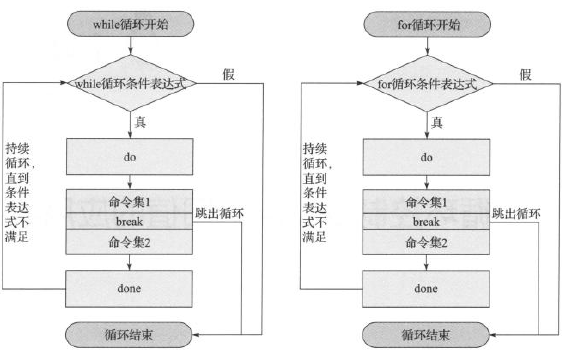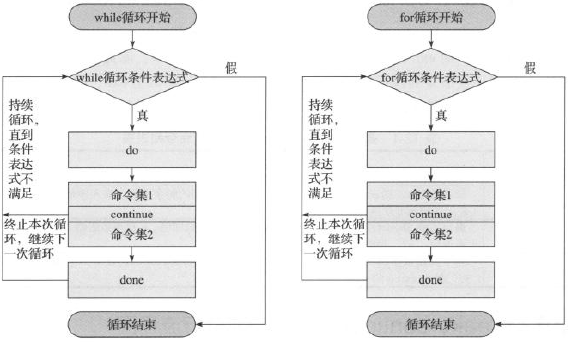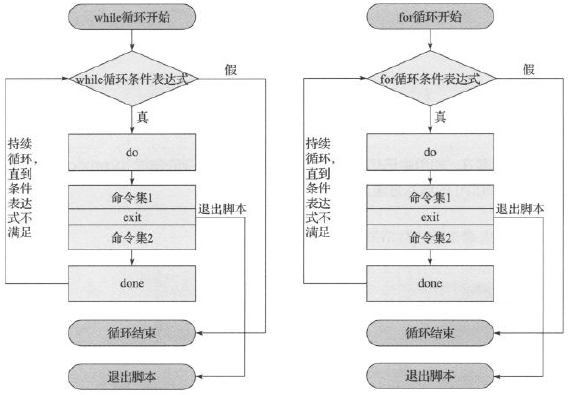1.break、continue、exit、return的对比
break、continue在条件语句和循环语句中用于控制程序走向;
exit用于终止所有语句并退出当前脚本,还可以返回上一次程序或命令的执行状态值给当前shell;
return用于在函数内部返回函数执行的状态值。




2.基础示例
(1)break
[root@codis-178 ~]# cat 12_1.sh
#!/bin/bash
if [ $# -ne 1 ];then
echo $"usage:$0 {break|continue|exit|return}"
exit 1
fi
test(){
for((i=0;i<=5;i++))
do
if [ $i -eq 3 ];then
$*;
fi
echo $i
done
echo "I am in func."
}
test $*
func_ret=$?
if [ `echo $*|grep return|wc -l` -eq 1 ]
then
echo "return's exit status:$func_ret"
fi
echo "ok"
[root@codis-178 ~]# sh 12_1.sh
usage:12_1.sh {break|continue|exit|return}
[root@codis-178 ~]# sh 12_1.sh break
0
1
2
I am in func.
ok
[root@codis-178 ~]# sh 12_1.sh continue
0
1
2
4
5
I am in func.
ok
3.企业案例
(1)实现服务器临时配置多个IP,并且可以随时撤销配置的所有IP,IP范围:10.0.3.1~10.0.3.16,其中10不能配置。
[root@codis-178 ~]# cat 12_2.sh
#!/bin/bash
[ -f /etc/init.d/functions ] && . /etc/init.d/functions
RETVAL=0
op(){
if [ "$1" == "del" ];then
list=`echo {16..1}`
else
list=`echo {1..16}`
fi
for ip in $list
do
if [ $ip -eq 10 ];then
continue
fi
ip addr $1 10.0.2.$ip/24 dev eth1 label eth1:$ip &>/dev/null
RETVAL=$?
if [ $RETVAL -eq 0 ];then
action "$1 $ip" /bin/true
else
action "$1 $ip" /bin/false
fi
done
return $RETVAL
}
case "$1" in
start)
op add
RETVAL=$?
;;
stop)
op del
RETVAL=$?
;;
restart)
op del
sleep 2
op add
RETVAL=$?
;;
*)
printf "Usage:$0 {start|stop|restart}
"
esac
exit $RETVAL
(2)分析Apache访问日志,把日志中每行的访问字节数所对应的字段数字相加,计算总和
[root@codis-178 ~]# cat 12_3.sh
#!/bin/bash
exec <$1
sum=0
while read line
do
num=`echo $line|awk '{print $10}'`
[ -n "$num" -a "$num" = "${num//[^0-9]/}"] || continue
((sum=sum+num))
done
echo "${1}:${sum} byte = `echo $((${sum}/1024))`KB"
(3)已知下面的字符串是通过RANDOM随机数采用md5sum加密后任意取出的连续10为数字,请破解这些字符串对应的md5sum数字
4fe8bf20ed
思路:
1.RANDOM取值0~32767,通过md5sum加密后,把加密后的字符串和加密前的数字存入文本中
[root@codis-178 ~]# cat 12_4.sh
#!/bin/bash
for n in {0..32767}
do
echo "`echo $n|md5sum` $n" >>zhiwen.log
done
[root@codis-178 ~]# sh 12_4.sh
[root@codis-178 ~]# cat zhiwen.log |head -5
897316929176464ebc9ad085f31e7284 - 0
b026324c6904b2a9cb4b88d6d61c81d1 - 1
26ab0db90d72e28ad0ba1e22ee510510 - 2
6d7fce9fee471194aa8b5b6e47267f03 - 3
48a24b70a0b376535542b996af517398 - 4
2.将字符串与文本进行对比
[root@codis-178 ~]# cat 12_4_1.sh
#!/bin/bash
md5char="4fe8bf20ed"
while read line
do
if [ `echo $line|grep "$md5char"|wc -l` -eq 1 ];then
echo $line
break
fi
done </root/zhiwen.log
[root@codis-178 ~]# sh 12_4_1.sh
1dcca23355272056f04fe8bf20edfce0 - 5